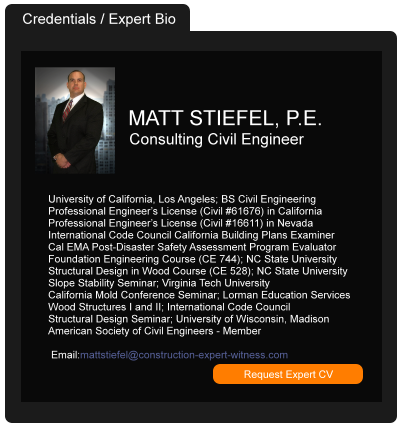When Coronavirus Cases Spike at Construction Jobsites
July 27, 2020 —
Richard Korman, Scott Judy & Jeff Rubenstone - Engineering News-RecordWhen Covid-19 took hold in several US states in early spring, Choate Construction responded, as many contractors did, by quickly adopting federal workplace safety guidelines for disinfecting surfaces and maintaining social distancing. Enhanced by various state lockdown measures for businesses and the general public, the new safety system seemed to work with only a handful of workers on Choate’s projects testing positive.
Reprinted courtesy of Engineering News-Record reporters
Richard Korman,
Scott Judy and
Jeff Rubenstone
Mr. Korman may be contacted at kormanr@enr.com
Mr. Judy may be contacted at judys@enr.com
Mr. Rubenstone may be contacted at rubenstonej@enr.com
Read the full story... Read the court decisionRead the full story...Reprinted courtesy of
Attorney’s Fees Entitlement And Application Under Subcontract Default Provision
May 06, 2019 —
David Adelstein - Florida Construction Legal UpdatesMany subcontracts contain a provision in the default section that reads something to the effect:
“Upon any default, Subcontractor shall pay to Contractor its attorney’s fees and court costs incurred in enforcing this Subcontract or seeking any remedies hereunder.”
Oftentimes, a party may wonder as to the enforceability of the provision and how it is applied in the context of a dispute between a contractor and its subcontractor where both parties have asserted claims against the other.
In an opinion out of the Middle District of Georgia, U.S. f/u/b/o Cleveland Construction, Inc. v. Stellar Group, Inc., 2019 WL 338887 (M.D.Ga. 2019), a subcontractor and prime contractor on a federal construction project each asserted claims against the other in the approximate amount of $4 Million, meaning there was a potential $8 Million swing in the dispute.
The subcontract contained a provision entitling the contractor to recover attorney’s fees incurred in enforcing the subcontract or seeking remedies under the subcontract upon any default, identical to the provision above.
Read the court decisionRead the full story...Reprinted courtesy of
David Adelstein, Kirwin Norris, P.A.Mr. Adelstein may be contacted at
dma@kirwinnorris.com
Delaware Supreme Court Allows Shareholders Access to Corporation’s Attorney-Client Privileged Documents
August 13, 2014 —
Marc S. Casarino and Lori S. Smith – White and Williams LLPDelaware corporations may be required to turn over internal documents of directors and officers, including those of in-house counsel, where the factors enumerated in Garner v. Walfinbarger, 430 F.2d 1093 (5th Cir. 1970) weigh in favor of disclosure. In a July 23, 2014 decision of first-impression, the Delaware Supreme Court ruled in Wal-Mart Stores, Inc. v. Indiana Electrical Workers Pension Trust Fund IBEW, that the Garner doctrine applies to plenary shareholder/corporation disputes, as well as to books and records inspection actions under Section 220 of the Delaware General Corporation Law. The Garner doctrine provides that a shareholder may invade the corporation’s attorney-client privilege in order to prove fiduciary breaches by those in control of the corporation upon a showing of good cause. The non-exhaustive list of factors by which a finding of good cause should be tested are:
“(i) the number of shareholders and the percentage of stock they represent; (ii) the bona fides of the shareholders; (iii) the nature of the shareholders’ claim and whether it is obviously colorable; (iv) the apparent necessity or desirability of the shareholders having the information and the availability of it from other sources; (v) whether, if the shareholders’ claim is of wrongful action by the corporation, it is of action criminal, or illegal but not criminal, or of doubtful legality; (vi) whether the communication is of advice concerning the litigation itself; (vii) the extent to which the communication is identified versus the extent to which the shareholders are blindly fishing; and (viii) the risk of revelation of trade secrets or other information in whose confidentiality the corporation has an interest for independent reasons.”
Reprinted courtesy of
Marc S. Casarino, White and Williams LLP and
Lori S. Smith, White and Williams LLP
Mr. Casarino may be contacted at casarinom@whiteandwilliams.com; Ms. Smith may be contacted at smithl@whiteandwilliams.com
Read the court decisionRead the full story...Reprinted courtesy of
Another (Insurer) Bites The Dust: Virginia District Court Rejects Narrow Reading of Pollution Exclusion
September 10, 2018 —
Michael S. Levine & Latosha M. Ellis - Hunton Insurance Recovery BlogIn a victory for policyholders, and an honorable mention for Merriam-Webster’s Dictionary, a federal judge in Virginia ruled that the dispersal of concrete dust that damaged inventory stored in an aircraft part distributor’s warehouse was a pollutant, as defined by the policy, but that it also constituted “smoke” as that term was defined in the dictionary, thereby implicating an exception to the policy’s pollution exclusion. The Court then granted summary judgment for the policyholder, who had suffered a $3.2 million loss.
Reprinted courtesy of
Michael S. Levine, Hunton Andrews Kurth and
Latosha M. Ellis, Hunton Andrews Kurth
Mr. Levine may be contacted at mlevine@HuntonAK.com
Read the court decisionRead the full story...Reprinted courtesy of
Federal Miller Act Payment Bond Claim: Who Gets Paid and Who Does Not? What Are the Deadlines?
September 16, 2019 —
William L. Porter - Porter Law GroupWhen working on federal public works construction projects there are no Stop Payment Notice or Mechanics Lien remedies available to protect subcontractors’ and suppliers’ right to payment. Instead, unpaid subcontractors and suppliers must resort to making a claim for payment under a federal law known as the AMiller Act@ (40 USCS 3131 et seq.). Many claimants however, do not realize that the right to make a Miller Act claim is not available to all subcontractors and suppliers. Before committing to performing work on a federal project it is important for subcontractors and suppliers to understand whether or not a Miller Act claim will be available. For those who have no Miller Act rights, careful consideration must be given to whether it is worth the risk to take on the project. For those who have valid Miller Act claim rights, important deadlines must be considered.
Who Gets Paid Under a Miller Act and Who Does Not
For federal projects in excess of $100,000, contractors who have a contract directly with the Federal Government must obtain Miller Act Payment Bond intended for the protection of Subcontractors, laborers and material suppliers to the project.
As a general rule, every subcontractor, laborer, or material supplier who deals directly with the prime contractor and is unpaid may bring a lawsuit for payment against the Miller Act Payment Bond. Further, every unpaid subcontractor, laborer, or material supplier who has a direct contractual relationship with a first-tier subcontractor may bring such an action. The deadlines for these claims are described below.
Read the court decisionRead the full story...Reprinted courtesy of
William L. Porter, Porter Law GroupMr. Porter may be contacted at
bporter@porterlaw.com
U.S. Navy Sailors Sue Tokyo Utility Company Over Radiation Poisoning
April 09, 2014 —
Beverley BevenFlorez-CDJ STAFFIn a one billion dollar lawsuit, U.S. Navy sailors contend that they “suffered massive doses of radiation” from the Fukushima Dia-ichi nuclear power plant in Toyko, Japan while stationed on the USS Ronald Reagan, reported the Orange County Register. A tsunami (caused by a 9.0 earthquake) flooded the plant, “cutting off electrical power and disabling backup generators.” The USS Reagan was sent to provide aid, but the plant then “blew up” before they arrived.
“Sailors on the flight deck said they felt a warm gust of air, followed by a sudden snow storm: radioactive steam,” according to the Orange County Register. “Freezing in the cold Pacific air. Blanketing their ship.”
However, the Orange County Register posed the question, “Could the Reagan – one of the most advanced nuclear aircraft carriers in the U.S. fleet – really not know that it was being showered with massive doses of radiation?” TEPCO, the company being sued by the sailors, answered that it’s “wholly implausible.”
Read the court decisionRead the full story...Reprinted courtesy of
Illinois Court Determines Insurer Must Defend Property Damage Caused by Faulty Workmanship
July 11, 2011 —
Tred R. Eyerly - Insurance Law HawaiiThe Illinois Court of Appeals determined the insurer must defend allegations of property damage arising from faulty workmanship. Milwaukee Mut. Ins. Co. v. J.P. Larsen, Inc., 2011 Ill. App. Unpub. LEXIS 1443 (Ill. Ct. App. June, 20, 2011).
�Larsen was a subcontractor for Weather-Tite in a condominium building. Weather-Tite installed windows on the project and hired Larsen to apply sealant to the windows. The windows subsequently leaked and caused water damage within the complex.
�The homeowner’s association sued Weather-Tite for breach of express and implied warranties. Weather-Tite filed a third-party complaint against Larsen, seeking contribution and alleging that Larsen was in breach of contract by failing to add Weather-Tite as an additional insured under Larsen’s CGL policy.
�Both Weather-Tite and Larsen tendered to Larsen’s insurer. Both tenders were denied because the insurer contended the complaints alleged only construction defects, and not “property damage” or an “occurrence” within the terms of the policy.
�The insurer filed suit for a declaratory judgment. The trial court granted the insurer’s motion as to Weather-Tite, but granted Larsen’s cross-motion for summary judgment.
�Read the full story…
�Reprinted courtesy of Tred R. Eyerly, Insurance Law Hawaii. Mr. Eyerly can be contacted at te@hawaiilawyer.com
Read the court decisionRead the full story...Reprinted courtesy of
Brooklyn’s Industry City to Get $1 Billion Modernization
March 12, 2015 —
David M. Levitt – Bloomberg(Bloomberg) -- A late 19th century industrial complex on New York’s Brooklyn waterfront is slated for a $1 billion makeover that aims to transform the property into a modern hub for manufacturing and technology.
The owners of Industry City, Atlanta-based Jamestown and its partners, plan to invest about $890 million over the next 12 years, and anticipate tenants will put in about $150 million of their own money, according to a proposal announced Monday. The project will create one of the largest centers for the “innovation economy” in the U.S., and one of New York’s biggest engines of job growth, said Andrew Kimball, chief executive officer of Industry City.
Read the court decisionRead the full story...Reprinted courtesy of
David M. Levitt, BloombergMr. Levitt may be contacted at
dlevitt@bloomberg.net


































































